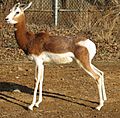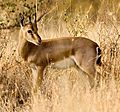Gazelle facts for kids
Quick facts for kids Gazelle |
|
|---|---|
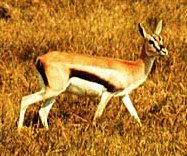 |
|
| Thomson's gazelle | |
| Scientific classification | |
| Kingdom: | |
| Phylum: | |
| Class: | |
| Infraclass: | |
| Superorder: | |
| Order: | |
| Family: | |
| Subfamily: |
Antilopinae
|
| Genus: |
Eudorcas
Günther, 1884
|
A gazelle is a type of antelope. These graceful animals are known for being super fast! They are part of a group of animals called Gazella. This article also talks about six other species that are very similar. These used to be grouped under Gazella but are now in their own groups, Eudorcas and Nanger. There's also a third group, Procapra, which includes three types of Asian gazelles.
Gazelles are amazing runners. Some can sprint as fast as 100 km/h (60 mph)! They can also run steadily at 50 km/h (30 mph). You can find gazelles mostly in the deserts, grasslands, and savannas of Africa. They also live in southwest and central Asia and the Indian subcontinent. Gazelles usually live in herds. They like to eat soft, easy-to-digest plants and leaves.
Gazelles are fairly small antelopes. Most stand about 60–110 cm (2–3.5 ft) tall at the shoulder. They are usually a fawn (light brown) color.
Contents
Amazing Gazelles: Fast and Graceful Antelopes
The main group of gazelles, Gazella, has about 10 different kinds, called species. Sadly, four types of gazelles are now extinct. This means they no longer exist on Earth. These include the red gazelle, the Arabian gazelle, the Queen of Sheba's gazelle, and the Saudi gazelle. Many gazelle species that are still alive are considered threatened. This means their numbers are getting low. Animals closely related to gazelles include the Tibetan and Mongolian gazelles, the blackbuck from Asia, and the African springbok.
Meet Thomson's Gazelle
One very well-known gazelle is the Thomson's gazelle (Eudorcas thomsoni). You can find them in Africa. They are about 60 to 70 cm (24 to 28 in) tall at the shoulder. They are brown and white with a clear black stripe on their side. Male Thomson's gazelles have long, often curved, horns.
Gazelle Defenses: The Stotting Jump
Like many animals that are hunted by predators, Thomson's gazelles (often called "Tommies") and springboks have a special behavior. When they feel threatened by animals like cheetahs, lions, African wild dogs, crocodiles, hyenas, and leopards, they do something called stotting. This means they run and jump high into the air before running away. It's like they are showing the predator how strong and fast they are!
Gazelle Species Around the World
Gazelles are grouped into three main types, called genera (plural of genus), and many different species. Here's a look at some of them:
| Genus | Common and binomial names | Image | Range |
|---|---|---|---|
| Gazella | Arabian gazelle G. arabica |
Arabian Peninsula | |
| Cuvier's gazelle G. cuvieri |
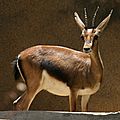 |
Algeria, Morocco and Tunisia | |
| Dorcas gazelle G. dorcas |
 |
North and saharan Africa, Sinai and Israel | |
| Goitered gazelle G. subgutturosa |
 |
Northern Azerbaijan, eastern Georgia, part of Iran, parts of Iraq and southwestern Pakistan, southeastern Turkey, Afghanistan and the Gobi Desert | |
| Chinkara or Indian gazelle G. bennettii |
 |
Iran, Pakistan and India | |
| Mountain gazelle G. gazella |
 |
Israel, the Golan Heights, and Turkey | |
| Rhim gazelle G. leptoceros |
 |
Algeria, Chad, Egypt, Libya and Sudan | |
| Speke's gazelle G. spekei |
 |
Horn of Africa | |
| Neumann's gazelle G. erlangeri |
Arabian Peninsula | ||
| †Saudi gazelle G. saudiya |
Arabian Peninsula | ||
| Eudorcas | Mongalla gazelle E. albonotata |
Floodplain and savanna of South Sudan | |
| Red-fronted gazelle E. rufifrons |
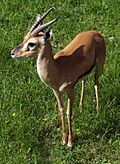 |
The Sahel region of central Africa | |
| †Red gazelle E. rufina |
Mountain areas of North Africa | ||
| Thomson's gazelle E. thomsoni |
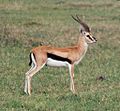 |
East Africa | |
| Nanger | Dama gazelle N. dama |
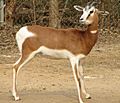 |
Sahara desert and the Sahel |
| Grant's gazelle N. granti |
 |
Northern Tanzania to South Sudan and Ethiopia, and from the Kenyan coast to Lake Victoria | |
| Soemmerring's gazelle N. soemmerringii |
 |
Horn of Africa |
† = extinct
Images for kids
-
Grant's gazelle (male)
-
Cuvier's gazelle (female)
-
Thomson's gazelle (male)
-
Goitered gazelle (females and young)
-
Chinkara (female)
-
Dorcas gazelle (female)
-
Mountain gazelle (male)
-
Soemmerring's gazelle (females)
-
Slender-horned gazelle (male)
 | Valerie Thomas |
 | Frederick McKinley Jones |
 | George Edward Alcorn Jr. |
 | Thomas Mensah |




